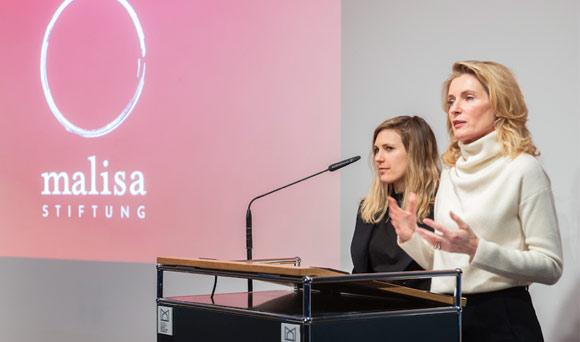WHAT A YEAR!

The year 2020 was an unusual one for everyone, and the MaLisa Foundation was no exception. Shortly after the year began, the Corona pandemic changed how we live and work. We look back on an eventful year. Many plans had to be changed, and the urgency of our core issues became even clearer. With two studies and numerous other activities, we contributed to the advancement of diversity and gender equality in the media industry.
At the beginning of the year – hardly imaginable from today’s perspective – the Berlinale film festival took place. There, representatives of Germany’s six major film schools were joined by our co-founder Maria Furtwängler, and presented their activities on gender justice. Two years earlier at the Berlinale, they had published a joint statement of commitments regarding gender equality. During the film schools‘ annual event at the Berlinale in 2020, they presented their progress in implementing that commitment. The MaLisa Foundation has supported and accompanied this process from the beginning. We look forward to continuing to do so.
Then came the pandemic. Like so many, we had to change our plans. The Diversity Summit planned for March had to be postponed, and with it the publication of our study “Gender Representations and Diversity in Streaming and SVOD Fictional Serial Content“. The study, which was funded by the Film- und Medienstiftung NRW, ZDF and the MaLisa Foundation, is the first analysis of the representations regarding gender, sexual orientation and ethnic attribution in streaming and SVOD series in the German market. It was conducted under the leadership of our long-time and highly esteemed partner Prof. Dr. Elizabeth Prommer.
The results showed: Streaming and SVOD series on the German market are not as diverse as is often postulated. Especially in terms of gender balance, German productions lag behind. With a share of 35 percent, women are least likely to be seen in central roles – the lowest proportion in an international comparison. Across all countries, streaming productions have something in common, notably a clear age gap: As they get older, women increasingly disappear from the screen.
The COVID-19 pandemic revealed particular imbalances in terms of gender equity. In the spring, we examined the related media and political discourses with our tried and tested approach, i.e. analyzing hard data, rather than relying on “gut feelings”. Our data partners were Prof. Dr. Elizabeth Prommer and Julia Stüwe, who examined two weeks of television coverage, and Max Berggren, who evaluated the reports in the online editions of thirteen print media.
The results of our studies on the “gender distribution in Corona reporting” were sobering: In TV programmes, only one out of five experts was female. Even in the areas of care-giving/nursing and medicine, in which the workforce consists predominantly of women, only 17% of the experts interviewed were female. In total, both TV reporting and online editions of print media featured twice as many men as women.
To advocate for more diverse perspectives in the media overall, we continued our work with partners in the industry. We hosted conversations and workshops online instead of in person, contributed to policy discourse in the fields of media education, culture and gender equality, and we strengthened our networking with other initiatives that advocate for diversity in media and culture, both in Germany and internationally.
Outlook for 2021
We will build on these activities in the coming year. We will continue to provide facts and figures, and we will further support our partners in the industry in developing and implementing solutions – so that the full diversity of our society is reflected in film and media, as well as in other important cultural fields such as the music industry.
In 2021, we will again join forces with our partners to publish a follow-up study on audiovisual diversity in German television and film. We eagerly await the results, which will show what has changed since the publication of the first study in 2017, and will offer new insight into various diversity characteristics.
We will also launch the first study on the portrayal of violence against women in German television, led by Prof. Dr. Christine Linke. We are very much looking forward to working with her to shed more light on this important topic, and we are very happy to partner with the UFA on this initiative. In 2020, the latter not only launched the multi-partner campaign #sicherheim, but also became the first German production company to commit to more diversity in front of and behind the camera.
In addition, in 2021 we will extend and deepen our work on gender equality in the music industry. We will strengthen and expand our networks, analyze data and identify problem-solving approaches.
We were thrilled about the news that we will receive the Soroptimist Germany Award in 2021. We are grateful for this expression of appreciation and recognition of our work.
Looking back on a truly extraordinary year and looking forward to the coming one, we are very grateful to the countless partner institutions and individuals with whom we pursue our shared goals. The past year has highlighted once more how important and invigorating these partnerships and alliances are: Together, we are more than the sum of our parts and can make a bigger difference. This is something we will gladly carry over from 2020 into 2021!